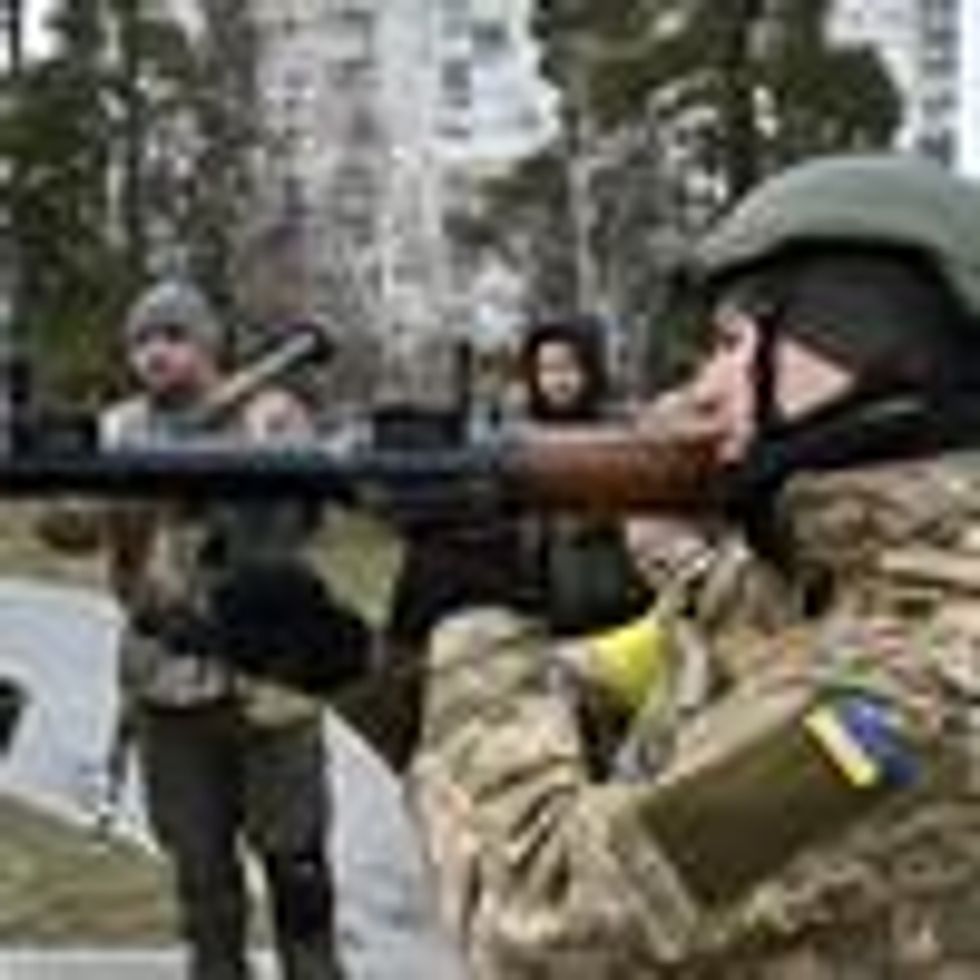Earlier this week, Pentagon chief Lloyd Austin openly acknowledged something that analysts and critics of American foreign policy have suspected since Russia attacked Ukraine in February: That one of the Biden administration's primary objectives in arming Ukrainian forces to the teeth is to severely degrade Russia's military capacity.
"We want to see Russia weakened to the degree that it can't do the kinds of things that it has done in invading Ukraine," Austin told reporters Monday following a visit to Kyiv, where he and U.S. Secretary of State Antony Blinken pledged an additional $713 million in military aid to Ukraine, which has received billions of dollars worth of heavy weaponry from the Biden administration.
"This is a recipe for perpetual war, and monstrous losses and suffering for Ukrainians."
"We want to see the international community more united," Austin continued, "especially NATO."
Insofar as weakening Russia's military in the short-term is necessary to help Ukraine fend off a deadly and illegal war of aggression, Austin's summary of U.S. aims was seen by some commentators as perfectly sensible and obvious.
But other observers and anti-war campaigners warned that the Pentagon secretary's remarks hinted at a longer-term U.S. foreign policy agenda that, if pursued, could prolong warfare in Ukraine and heighten the risk of a direct military confrontation between Russia and NATO.
An unnamed congressional source articulated that long-term view to CNN on Tuesday. "The way we are looking at this," the person said, "is that it's making an investment to neuter the Russian army and navy for next decade."
Anatol Lieven, a senior research fellow on Russia and Europe at the Quincy Institute for Responsible Statecraft, wrote in a column on Wednesday that "to judge by its latest statements, the Biden administration is increasingly committed to using the conflict in Ukraine to wage a proxy war against Russia, with as its goal the weakening or even destruction of the Russian state."
Lieven responded with heavy skepticism to Austin's claim that weakening Russia is necessary to--in the Pentagon chief's words--"make it harder for Russia to threaten its neighbors," which include NATO members such as Estonia, Lithuania, and Poland.
"There is no sign that Russia wants to or indeed could invade any other countries," Lieven argued. "As far as an attack on NATO is concerned, the miserable performance of the Russian military in Ukraine should have made absolutely clear that this is a fatuous chimera. If Russia cannot capture cities less than 20 miles from Russia's own border, the idea of an attack on NATO is ludicrous."
As for Austin's statement that Ukraine can "win" the war with Russia if the West provides enough military firepower, Lieven stressed that "the question is what 'winning' means."
"If it means preserving Ukrainian independence, freedom to join the European Union, and sovereignty over the great majority of Ukrainian territory, then this is a legitimate and necessary goal," he wrote. "Indeed, thanks to Ukrainian courage and Western weaponry, it has already to a great extent been achieved."
"If however what is meant by victory is Ukrainian reconquest--with Western help--of all the areas lost to Russia and Russian-backed separatists since 2014, then this is a recipe for perpetual war, and monstrous losses and suffering for Ukrainians," Lieven cautioned. "The Ukrainian army has fought magnificently in defense of its urban areas, but attacking entrenched Russian defensive positions across open country would be a very different matter."
Related Content
Anti-War Voices Say More Diplomacy--Not 'Weapons, Weapons, Weapons'--Needed in Ukraine
Jake Johnson
On the same day as Austin delivered his remarks to the press, Russian Foreign Minister Sergey Lavrov said in an interview that Moscow sees the West's accelerating shipments of increasingly advanced weaponry into Ukraine as evidence that NATO members are "going to war with Russia through a proxy."
Lavrov also raised the specter of nuclear conflict, which he said is a "serious" risk if the war continues to escalate.
"Under no circumstances should a Third World War be allowed to happen," Lavrov said as Russian forces intensified their assault on eastern Ukraine. "There can be no winners in a nuclear war."
"Talks of peace and deescalation are being replaced with signs of greater preparation for war. The U.S. is leading this move."
Asked about Lavrov's comments on Tuesday, Austin said that "nobody wants to see a nuclear war."
"Nobody can win that. And as we do things and as we, you know, take actions, we're always mindful of making sure that we have the right balance and that we're taking the right approach," Austin continued. "So, there's always, you know, a possibility that a number of things can happen. But, you know, again, I think it's unhelpful and dangerous... to rattle sabers and speculate about the use of nuclear weapons."
Austin's response came following a high-level gathering of more than 40 nations that are assisting Ukraine militarily and with humanitarian aid as it battles Russian forces.
Speaking to reporters after the meeting in Germany concluded, Austin announced that "today's gathering will become a monthly contact group on Ukraine's self-defense, and the contact group will be a vehicle for nations of good will to intensify our efforts and coordinate our assistance and focus on winning today's fight and the struggles to come."
The New York Times reported that the creation of the "contact group" represents "just one outward sign of how the Biden administration is adjusting to a war that has continued far longer than originally estimated and has consumed enormous amounts of munitions and money."
"Austin stood by comments he made in Poland on Monday, when he said that the United States now wanted Russia 'weakened' to the degree that it could not invade its neighbors in the future," the Times added. "He said that it was not a new stance."
Trita Parsi, executive vice president of the Quincy Institute, argued in a series of tweets Tuesday that "if someone had suggested a few weeks ago that the goal of U.S. policy is to weaken Russia rather than to defend Ukraine, they'd be labeled as Putin apologists."
"Now when Austin clarifies that the goal is weakening Russia (which gets us closer to a direct confrontation with nuclear Russia) then the reaction of much of the foreign policy establishment is, 'Of course that is the goal, what else should it be?!?'" Parsi wrote. "This is the slippery slope many have warned about."
"As the war continues, the goalposts change and objectives that earlier were flat-out rejected suddenly become 'no-brainers,'" he continued. "Policy is driven by tactical reactions to events, not strategy, and objectives are changed on the go without much deliberation. What could go wrong?"
For weeks, the U.S. and other western governments have faced criticism for failing to sufficiently engage in--and even actively hindering--efforts to achieve a diplomatic resolution in Ukraine as they continue pumping arms into the war zone.
In recent days, previous momentum toward a peaceful settlement appears to have collapsed entirely. Russian President Vladimir Putin declared earlier this month that negotiations with Ukraine were at a "dead end," and his meeting with U.N. Secretary-General Antonio Guterres in Moscow on Tuesday resulted in no discernible breakthroughs.
Lindsey German, a convenor of the U.K.-based Stop the War Coalition, warned in a blog post Tuesday that with Russia's war on Ukraine now in its third month, the conflict is "clearly developing as a proxy war between Russia and NATO."
"Putin is becoming increasingly dismissive of peace talks, as is [U.K. Prime Minister] Boris Johnson, who again ruled them out on his trip to India last week, claiming to talk peace with Putin was like dealing with 'a crocodile when it's got your leg in its jaws.' The alternative for Johnson is to send ever more weapons to Ukraine," German noted. "Talks of peace and deescalation are being replaced with signs of greater preparation for war. The U.S. is leading this move."
Austin's summary of U.S. objectives in Ukraine, German argued, constituted "a step further towards open-ended war involving NATO and Russia."
While emphasizing that Russia "is the clear aggressor and should withdraw its troops," German wrote that "those who urge the supply of weapons to end the war may do with the best intentions, but the effect is likely to be the opposite."
"The people of Ukraine are already the victims of this war and have suffered on a mass scale," she added. "Over 15,000 Russian soldiers have been killed. The unfolding prospects are horrific--of a war which rages on for a long time within the borders of Ukraine, as we have seen with Afghanistan, or one which begins to involve much wider forces and possible future nuclear conflict. The call to stop the war has never been more necessary."





